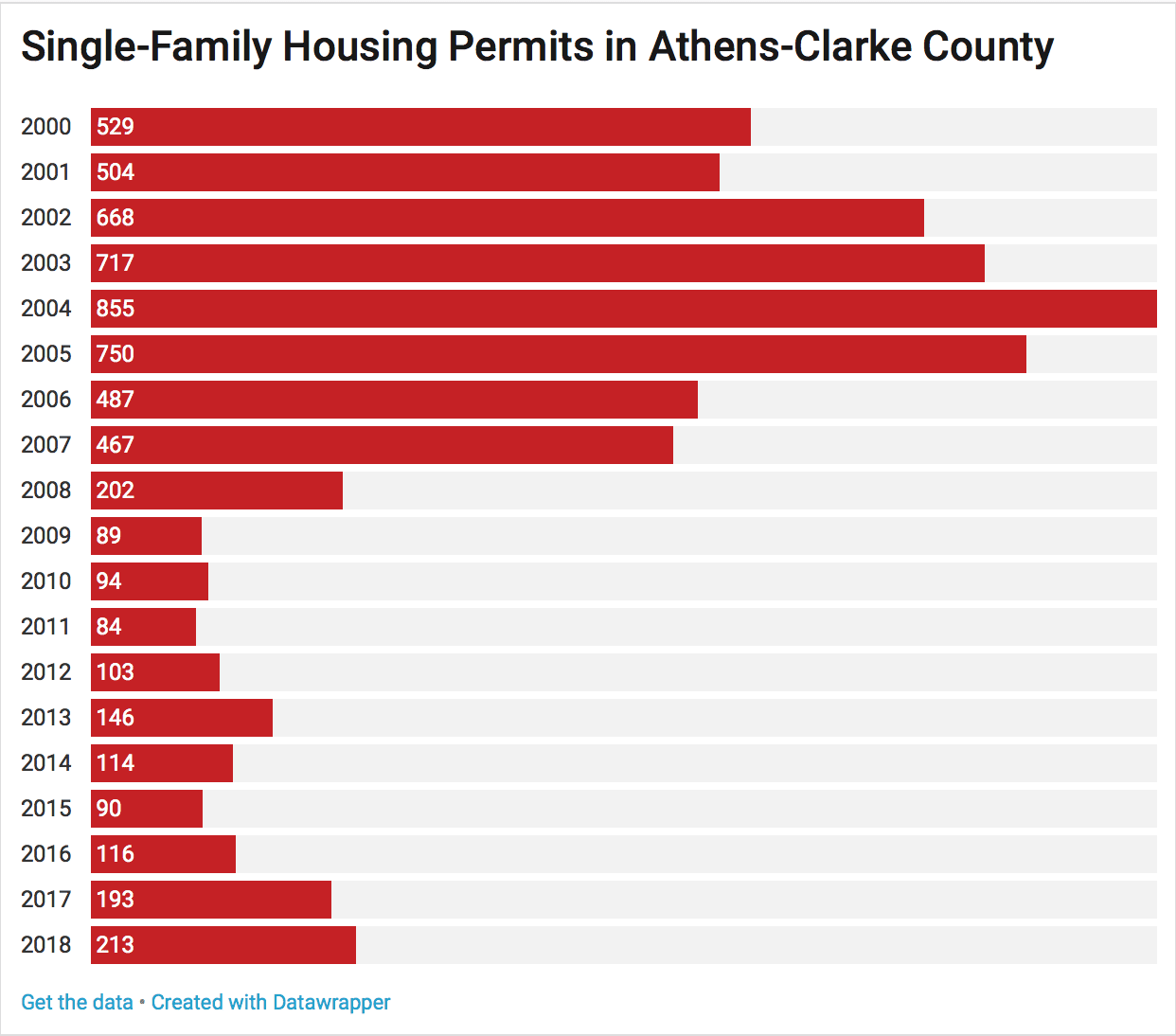During the housing boom of the mid-2000s, Athens-Clarke County received hundreds of single-family new construction permits yearly. As the housing crisis swept the nation, these numbers dropped drastically to levels below 100. Now, over the course of the past couple of years, the county has seen an increase in these permits yet again, and as of this August, the number of single-family housing permits has surpassed levels not seen in 10 years.
Why It’s Newsworthy: The Athens-Clarke County housing market is seeing an increase in new single-family construction that it hasn’t experienced in a decade. This change has the potential to affect housing prices, property taxes and the overall make-up of the county.
“We’ve seen a big increase in single family construction this year,” said Doug Hansford, director of the Athens-Clarke County Building Inspection Department. Hansford, a long-time Athens resident who has worked with the Athens-Clarke County government since 1990, had a few theories regarding what has caused the increase.

“I think there are a couple of reasons. One reason is Athens-Clarke County is doing really well in attracting businesses to the county,” Hansford said. “So for one, there’s just more jobs here and people are moving here.”
However, Hansford also noted that efforts by county officials could also be cause for the increase, specifically pointing to zoning ordinances. According to Hansford, changes made to the Athens-Clarke County zoning ordinances during the mid-2000s have encouraged building within the urban areas of the county rather than just focusing “outside the old city limits” in suburban areas.
“They wanted to encourage development within the city area, where you already have sewer service, you already have bus service and you already have water service. They changed some of the zoning guidelines to allow you to build on smaller lots and things like that to encourage people to start building in the urban areas again,” Hansford said. “We’ve seen a lot of that. The demand for vacant lots in the urban area has been high the last few years.”
Aron Hall, Neighborhood Notification Initiative coordinator planner II for the county, added to this list in noting pre-recession causes for the recent increase in single-family housing permits.
“A lot of these subdivisions that kind of went dormant during the recession are being built back out, and they’re being built back out at a rate that we haven’t seen prior to the recession,” Hall said. “They’re being sold quickly, too.”
Regarding where these new housing permits will have the most effect, Hansford pointed to two areas of Athens that are growing most rapidly—in-town and the west side of town, specifically pointing to the Boulevard and Normaltown neighborhoods.
For some residents of the county, the increase in construction hasn’t gone unnoticed. Amy Medlock, a resident of the Normaltown neighborhood, said the increase was not only noticeable, but at times worrisome.
“I have noticed an increase around us, and overall, I think it’s a good thing. I like living in town, so I can understand why people would,” Medlock said. “The only downside is that the zoning for those areas is not appropriate for the neighborhood exactly, so it’s much different than the actual existing neighborhood and feels quite different.”
Medlock added that she feels this isn’t a fault of the new occupants, or even the new builders—but more a consideration of the local government.
“Overall, I think it’s a positive thing,” Medlock said. “But, I think the city should have more forethought in the way that they zone those areas if they would like to continue to have infill and for it to be appropriate for the neighborhood.”
Those working directly with the issue seem to be cognizant of the necessity of forethought as well, as Hall noted similar concerns before also concluding that the increase is overall a positive for the community.
“I think, certainly we have to be smart about the kind of housing that is going up,” Hall said. “But, I think more housing leads to more opportunities and more services. I think it’s a good thing.”
Emma Korstanje is a senior majoring in Journalism in the Grady College of Journalism and Mass Communication at the University of Georgia.







